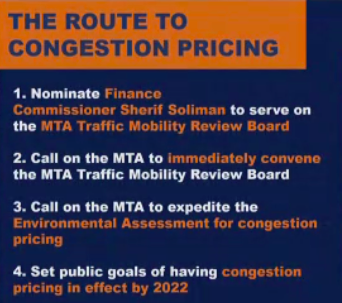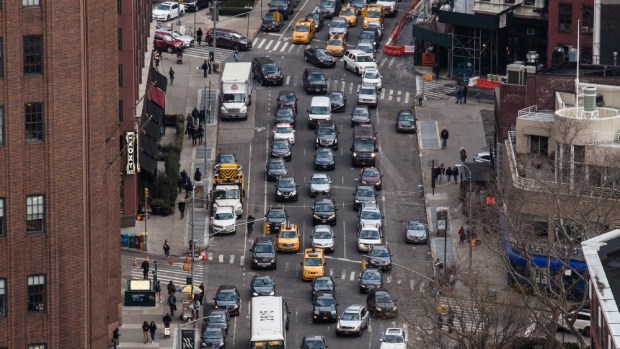We need congestion pricing so urgently that ... it can wait until next July, Mayor de Blasio said on Thursday morning.
In a bid to jumpstart the stalled Midtown tolling plan days after future mayor Eric Adams did just that, de Blasio devoted a significant portion of his morning press conference to relight the fire under Albany's ass, but undermined his own demands by setting a timetable that seemed lethargic at best, especially given that the MTA got approval from the Biden Administration in March to conduct a stripped down environmental assessment rather than a full-blown, years-long environmental impact statement to speed congestion pricing.
"The state and the MTA have to act and expedite the environmental assessment so we can get going," de Blasio said. "By June, all of the work should be done, and shovels should go in the ground by July ... of next year. ... But we haven’t seen action from the MTA and the time for action is now."
De Blasio indirectly criticized Gov. Cuomo, who has apparently been slow-walking congestion pricing, judging by recent comments from the MTA CFO, a Cuomo loyalist.
But the mention of de Blasio's urgent date of next July to implement a tolling scheme that was approved by the state legislature in 2019 and was originally slated to be in place by January, 2021, raised advocates' eyebrows immediately.
"Next July is at least six months too late," said congestion pricing advocate and planner Charles Komanoff. "New York City will literally be strangling in gridlock."

The mayor, of course, could declare that New York City is simply going to undertake congestion pricing on its own, experts have said for years. More recently, Komanoff championed this notion in his latest Streetsblog op-ed.
"Nothing in the 2019 statute [that created congestion pricing], bars New York City from implementing congestion pricing first," he said, citing legal experts who have been saying this for years. On Thursday, Komonoff explained how de Blasio could act.
"If the mayor can win [presumptive mayor] Eric Adams's buy-in, he can and should get a bill through the council, have the city Department of Transportation conduct the environmental assessment, install the tolling infrastructure and create the back office to collect the tolls," he said. "These can and must be done in parallel, not series. The revenue we're losing daily from not having congestion pricing is nearly $3 million. The additional efficiency and pollution costs are triple that amount."
By state law, congestion pricing must raise $1 billion in revenue from tolling, which can underwrite $15 billion in bonds to finance the state's $50-plus-billion capital construction budget to shore up the regional transit system, which is suffering increasing delays due to breakdowns.
And in declaring congestion pricing an "urgent" agenda item, de Blasio distanced himself from the governor by referring to scenes of flooding in the subway and those delays on trains.
"We’ve seen unprecedented problems in our subways," he said. "The flooding a few days ago. Shocking, painful, troubling. We can’t see that in the future. Unacceptable. The trips that have been cancelled! In the month of June alone, 10,800 subway trips cancelled. What does that mean? It means that straphangers wait and wait and wait. It means they can’t depend on the subway. If they can’t depend on the subway, the city doesn’t work."
The mayor's actions come a few days after his likely replacement Adams put the congestion pricing delay at the top of his agenda after the flooding:
This is what happens when the MTA makes bad spending decisions for decades. We need congestion pricing $ ASAP to protect stations from street flooding, elevate entrances and add green infrastructure to absorb flash storm runoff. This cannot be New York. https://t.co/F6A5K4ahQT
— Eric Adams (@ericadamsfornyc) July 8, 2021
As as practical matter, de Blasio became the first elected official to appoint a member to the Traffic Mobility Review, by appointing his top finance official, Sherif Soliman, to the panel, which will hold public hearings, consider exemptions, but ultimately rubber-stamp whatever tolling prices set by the MTA. Former federal transit official Larry Penner called for just such appointments back in November, 2020, when state law made such appointments possible.
The panel has never met. And the MTA claims the delays in environmental assessment are due to coordination issues with the federal government over how the community engagement process must be conducted, as Streetsblog reported. The MTA at one point claimed the EA could be finished in three months. But it has been 107 days since the Biden Administration greenlit the EA instead of the full-blown environmental impact statement.
Of course, advocates were on board with the mayor's demand for urgency. Eric Goldstein of the Natural Resources Defense Council anticipated some pushback on congestion pricing from non-supportive lawmakers from the suburbs and some far-flung areas of New York City who call the tolls a "regressive" tax on hard-working New Yorkers who "need" their cars.
"Regressive?" Goldstein said. "A clear no. Only 2 percent of the city's outer borough working poor would potentially pay this fee as part of a daily commute and 58 percent of the city's working poor rely on transit. So on an equity and mobility perspective, and from an air-quality perspective, congestion pricing is vital."
Julie Tighe of the New York League of Conservation Voters also focused on the positive environmental impact of congestion pricing (and, subtly, reminded the MTA that an environmental assessment of a car-reduction toll need not be very difficult).
"Last year, we saw how much improvement we can see in our air quality when traffic was down — there was a 25-percent decrease in air pollution ... in particular in communities of color and disadvantaged communities which are overburdened by this air pollution," she said. "Based on what’s happened in other places that have implemented congestion pricing, we expect that we will see a decrease of 2.1 billion [tons of] greenhouse gas emissions per year. In Stockholm, children hospitalizations from asthma decreased by nearly 50 percent when they implemented congestion pricing."
She said Soliman will "be a great advocate."
Streetsblog was not called on to ask a question at the mayor's press conference and have asked follow-ups. We also reached out the MTA for additional information, but got only a statement from MTA senior advisor Ken Lovett that suggested that the federal government is still causing some delay on beginning the environmental assessment: "To its credit, the Biden administration on March 30 directed us to conduct an environmental assessment process with robust public outreach," he told Streetsblog. "Since then, we have been in deep, detailed and productive discussions with the Federal Highway Administration over exactly what that entails. We will move forward on a timeline that meets all requirements set out for us." The FHWA declined to comment. A spokesman for Gov. Cuomo also declined.






